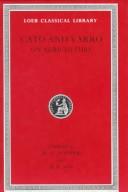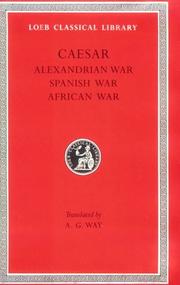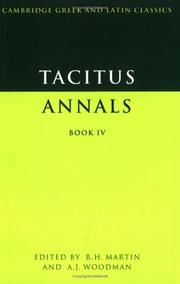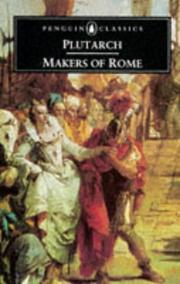| Listing 1 - 10 of 875 | << page >> |
Sort by
|
Book
ISBN: 0860546136 Year: 1989 Publisher: Oxford BAR
Abstract | Keywords | Export | Availability | Bookmark
 Loading...
Loading...Choose an application
- Reference Manager
- EndNote
- RefWorks (Direct export to RefWorks)
Rome --- Army --- -Equipment. --- Offprints --- Rim --- Roman Empire --- Roman Republic (510-30 B.C.) --- Romi (Empire) --- Equipment.
Periodical
ISSN: 2329115X Year: 1905 Publisher: New York, NY : Published for the Archaeological Institute of America by the Macmillan Co.,
Abstract | Keywords | Export | Availability | Bookmark
 Loading...
Loading...Choose an application
- Reference Manager
- EndNote
- RefWorks (Direct export to RefWorks)
Antiquities. --- Rome --- Rome (Empire) --- Antiquités --- Archaeological specimens --- Artefacts (Antiquities) --- Artifacts (Antiquities) --- Specimens, Archaeological --- Rim --- Roman Empire --- Roman Republic --- Romi --- Material culture --- Archaeology --- Byzantine Empire --- Italy --- Romi (Empire) --- Visual Arts - General --- Antiquities --- Antiquités. --- Roman Republic (510-30 B.C.) --- Rome (Italy)

ISBN: 0674993136 9780674993136 Year: 1999 Publisher: Cambridge Harvard university press
Abstract | Keywords | Export | Availability | Bookmark
 Loading...
Loading...Choose an application
- Reference Manager
- EndNote
- RefWorks (Direct export to RefWorks)
Cato's second century BCE De Agricultura is our earliest complete Latin prose text, recommends farming for its security and profitability, and advises on management of labor and resources. Varro's Res rustica (37 BCE) is not a practical treatise but instruction, in dialogue form, about agricultural life meant for prosperous country gentlemen.
Languages & Literatures --- Greek & Latin Languages & Literatures --- Agriculture --- Farming --- Husbandry --- Early works to 1800. --- Rome (Empire) --- Rim --- Roman Empire --- Roman Republic --- Rome --- Romi --- Industrial arts --- Life sciences --- Food supply --- Land use, Rural --- Romi (Empire) --- Byzantine Empire --- Italy

ISBN: 0674994434 Year: 2014 Publisher: Cambridge, MA : Harvard University Press,
Abstract | Keywords | Export | Availability | Bookmark
 Loading...
Loading...Choose an application
- Reference Manager
- EndNote
- RefWorks (Direct export to RefWorks)
Aulus Hirtius, friend of and military subordinate to Caesar (100-44BCE), may have written the The Alexandrian War. The African War and The Spanish War are detailed accounts clearly by officers who had shared in the campaigns. All three works provide important information on Caesar's career.
Languages & Literatures --- Greek & Latin Languages & Literatures --- Historians --- Military campaigns --- Rome (Empire) --- Campaigns, Military --- Historiographers --- Latin historians --- Rim --- Roman Empire --- Roman Republic --- Rome --- Romi --- Scholars --- Romi (Empire) --- Byzantine Empire --- Italy
Book
ISBN: 0674992547 9780674992542 Year: 2014 Volume: 231 Publisher: Cambridge, MA : Harvard University Press,
Abstract | Keywords | Export | Availability | Bookmark
 Loading...
Loading...Choose an application
- Reference Manager
- EndNote
- RefWorks (Direct export to RefWorks)
Florus (second century CE) wrote, in brief pointed rhetorical style, a two-book summary of Roman history (especially military) in order to show the greatness and decline of Roman morals. Based chiefly on Livy and perhaps planned to reach Florus' own times, the extant work ends with Augustus's reign (30 BCE-14 CE).
Languages & Literatures --- Greek & Latin Languages & Literatures --- Rome --- Rome (Empire) --- History --- Rim --- Roman Empire --- Roman Republic --- Romi --- Roman Republic (510-30 B.C.) --- Romi (Empire) --- Byzantine Empire --- Rome (Italy) --- Italy
Book
ISBN: 9780199287840 0199287848 0191558354 0191828408 Year: 2008 Publisher: Oxford Oxford university press
Abstract | Keywords | Export | Availability | Bookmark
 Loading...
Loading...Choose an application
- Reference Manager
- EndNote
- RefWorks (Direct export to RefWorks)
Octavia, --- Drama. --- Rome --- History --- Rim --- Roman Empire --- Roman Republic (510-30 B.C.) --- Romi (Empire) --- Byzantine Empire --- Rome (Italy)
Book
ISBN: 377492340X Year: 1988 Publisher: Bonn Habelt
Abstract | Keywords | Export | Availability | Bookmark
 Loading...
Loading...Choose an application
- Reference Manager
- EndNote
- RefWorks (Direct export to RefWorks)
Rome --- Commerce --- -History. --- Rim --- Roman Empire --- Roman Republic (510-30 B.C.) --- Romi (Empire) --- Byzantine Empire --- Rome (Italy) --- History.
Book
ISBN: 9780199664818 0199664811 0191749540 129962233X 019164210X 9780191642104 9780191749544 Year: 2013 Volume: *63 Publisher: Oxford Oxford University Press
Abstract | Keywords | Export | Availability | Bookmark
 Loading...
Loading...Choose an application
- Reference Manager
- EndNote
- RefWorks (Direct export to RefWorks)
McEvoy addresses the remarkable phenomenon of the Roman child-emperor. During the late fourth century the emperor Valentinian I, recovering from a life-threatening illness, took the novel step of declaring his eight year old son Gratian as his co-Augustus, actions which set a vital precedent.
Emperors --- Succession --- Rome --- History --- Rim --- Roman Empire --- Roman Republic (510-30 B.C.) --- Romi (Empire) --- Byzantine Empire --- Rome (Italy) --- History.

ISBN: 0521305047 0521315433 9780521315432 9780521305044 Year: 1990 Publisher: Cambridge Cambridge University press
Abstract | Keywords | Export | Availability | Bookmark
 Loading...
Loading...Choose an application
- Reference Manager
- EndNote
- RefWorks (Direct export to RefWorks)
Rome --- History --- -Rome --- Rim --- Roman Empire --- Roman Republic (510-30 B.C.) --- Romi (Empire) --- Rome - History - Tiberius, 14-37 --- Tacite,

ISBN: 0140441581 9780140441581 Year: 1989 Publisher: London Penguin books
Abstract | Keywords | Export | Availability | Bookmark
 Loading...
Loading...Choose an application
- Reference Manager
- EndNote
- RefWorks (Direct export to RefWorks)
Rome --- Biography. --- Rim --- Roman Empire --- Roman Republic (510-30 B.C.) --- Romi (Empire) --- Byzantine Empire --- Rome (Italy) --- Biography --- Rome - Biography
| Listing 1 - 10 of 875 | << page >> |
Sort by
|

 Search
Search Feedback
Feedback About UniCat
About UniCat  Help
Help News
News